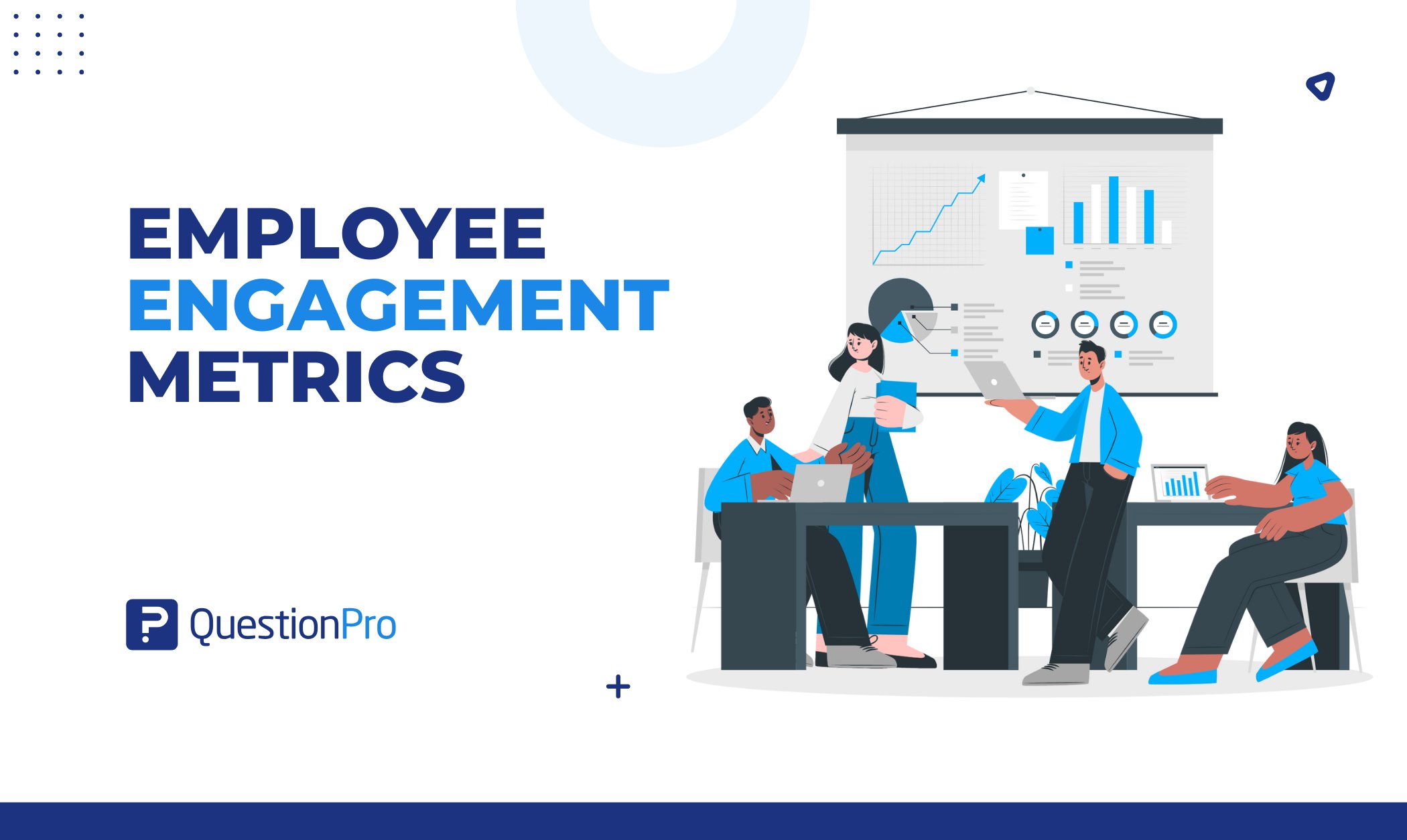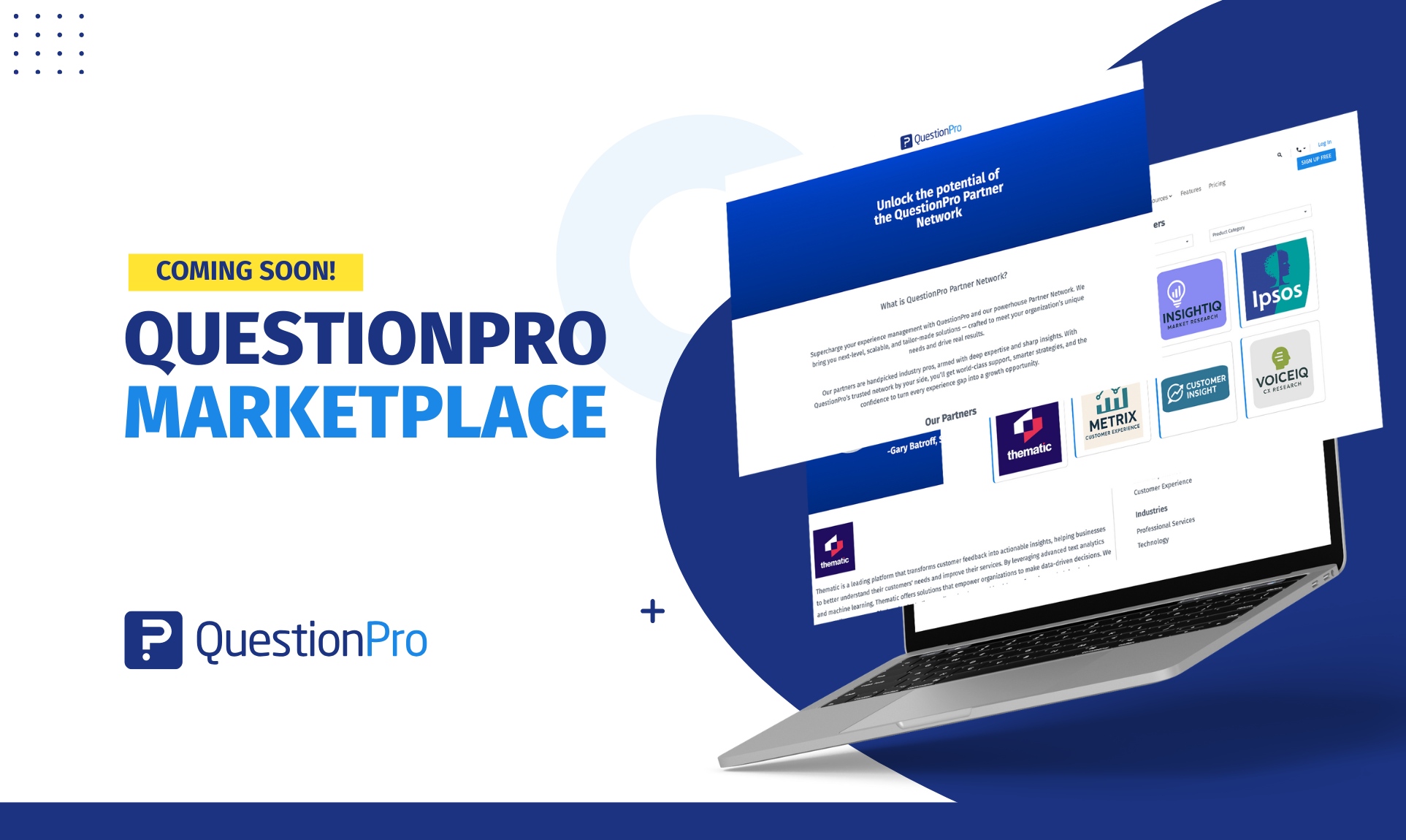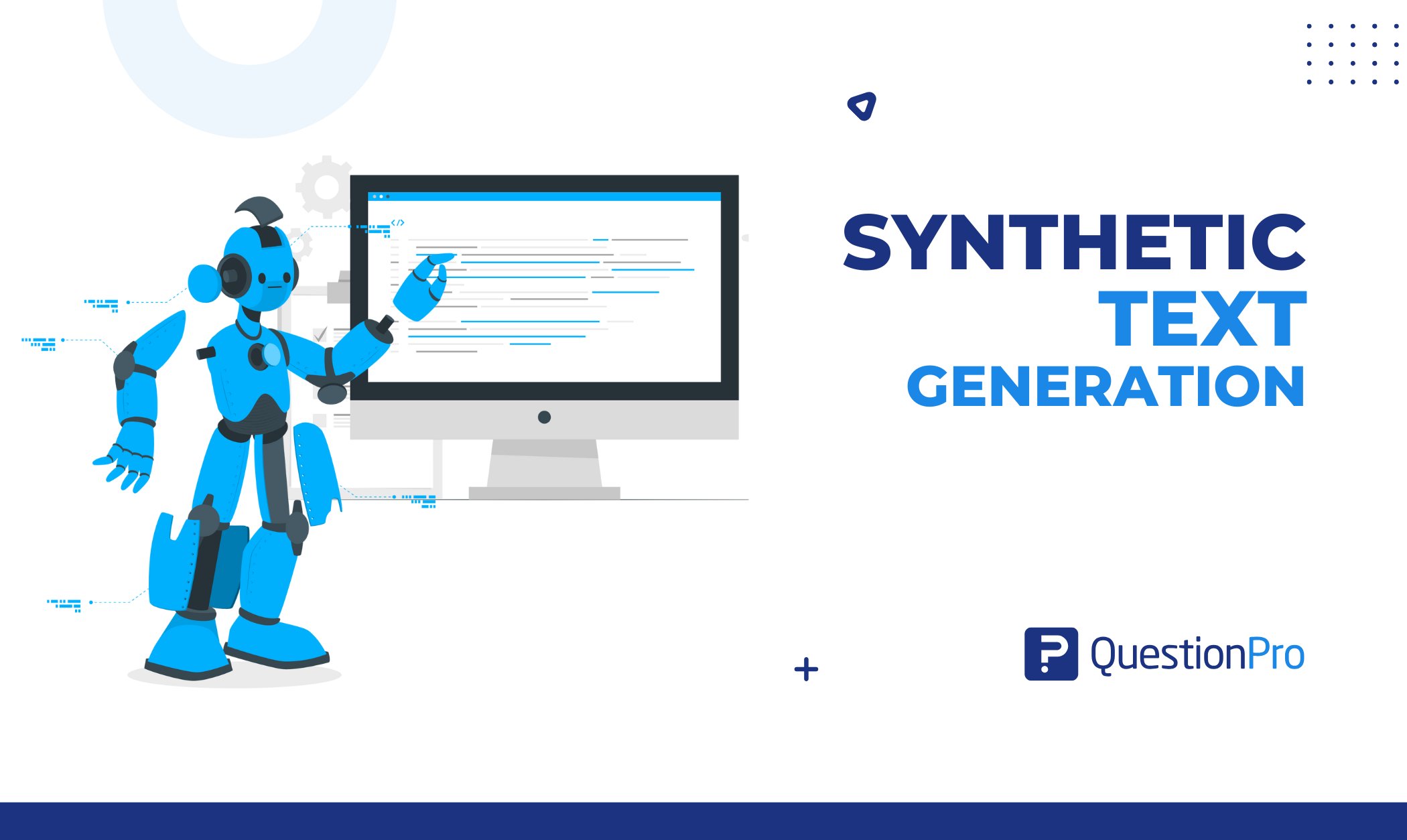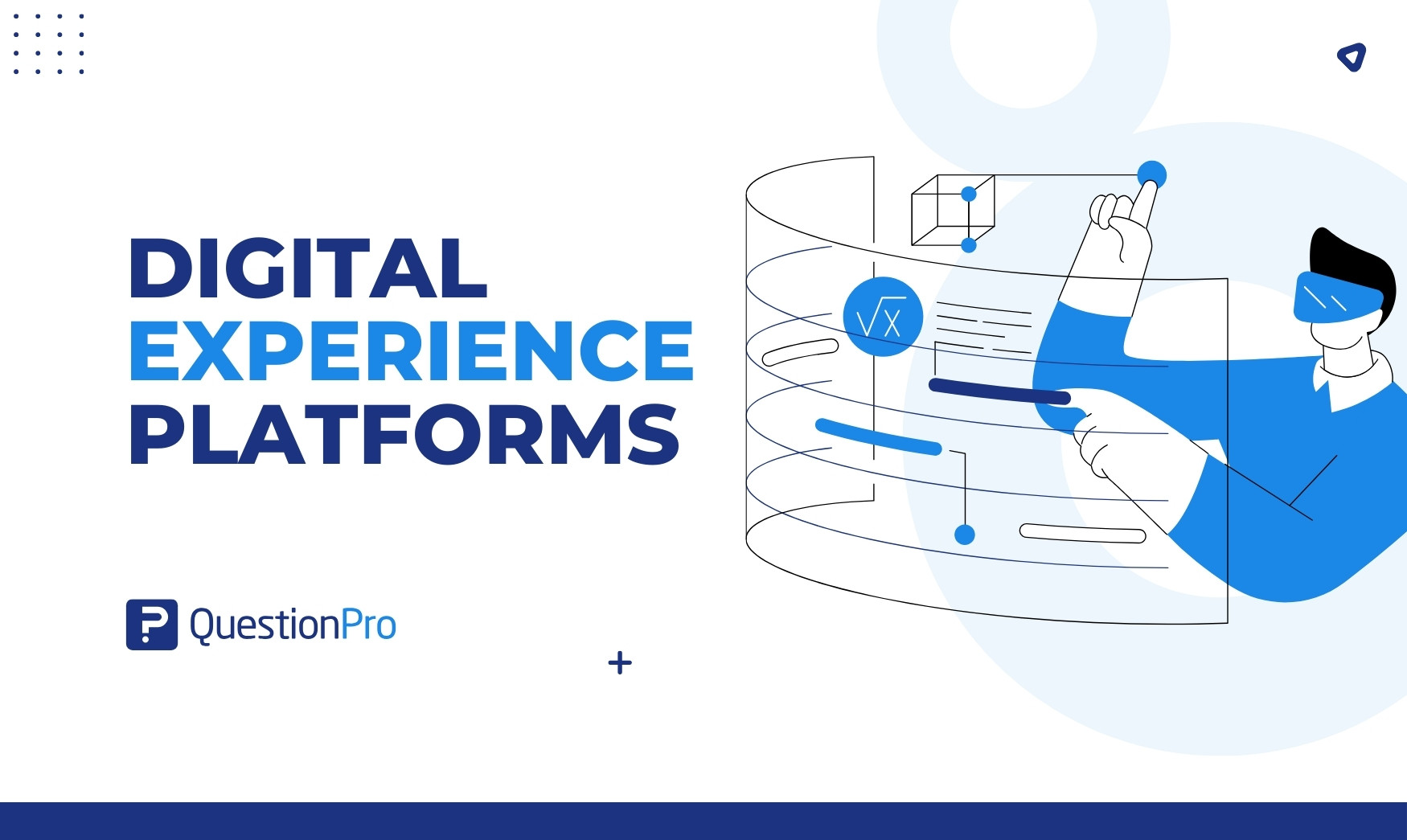
Customer expectations are higher than ever. They expect smooth and personalized experiences across all digital channels, from websites to mobile apps and social media platforms. Digital Experience Platforms empower businesses to meet these expectations by providing the tools and capabilities to manage digital experiences that boost customer engagement and loyalty.
Digital Experience Platforms (DXPs) enable organizations to create, manage, and optimize digital journeys across various touchpoints.In today’s article, we will discuss DXPs, some essential concepts, and a list of the best platforms on the market.
What is a Digital Experience Platform?
Digital Experience Platforms (DXPs) are designed to help businesses create, manage, and deliver smooth, personalized customer experiences. They work across multiple digital channels, such as websites, mobile apps, social media, and email.
These platforms combine different tools, such as content management, customer data tracking, and marketing automation. These platforms ensure that businesses can interact with their audience in a more personalized and consistent way.
It’s like a customer visiting your website, then seeing your brand on social media, and finally getting a follow-up email. A DXP ensures that all these interactions feel connected and personalized, creating a more engaging experience. The goal is to improve customer satisfaction, build stronger relationships, and ultimately boost sales and loyalty.
Digital Experience Platforms help businesses stay connected to their customers, providing the right content and messages at the right time, no matter where those customers are interacting with the brand online.
The Four Elements of a Digital Experience
Digital Experience Platforms (DXPs) are super tools that help businesses create awesome online experiences for people. Although they usually vary in their characteristics, some elements must be kept constant among the various available options; these are:
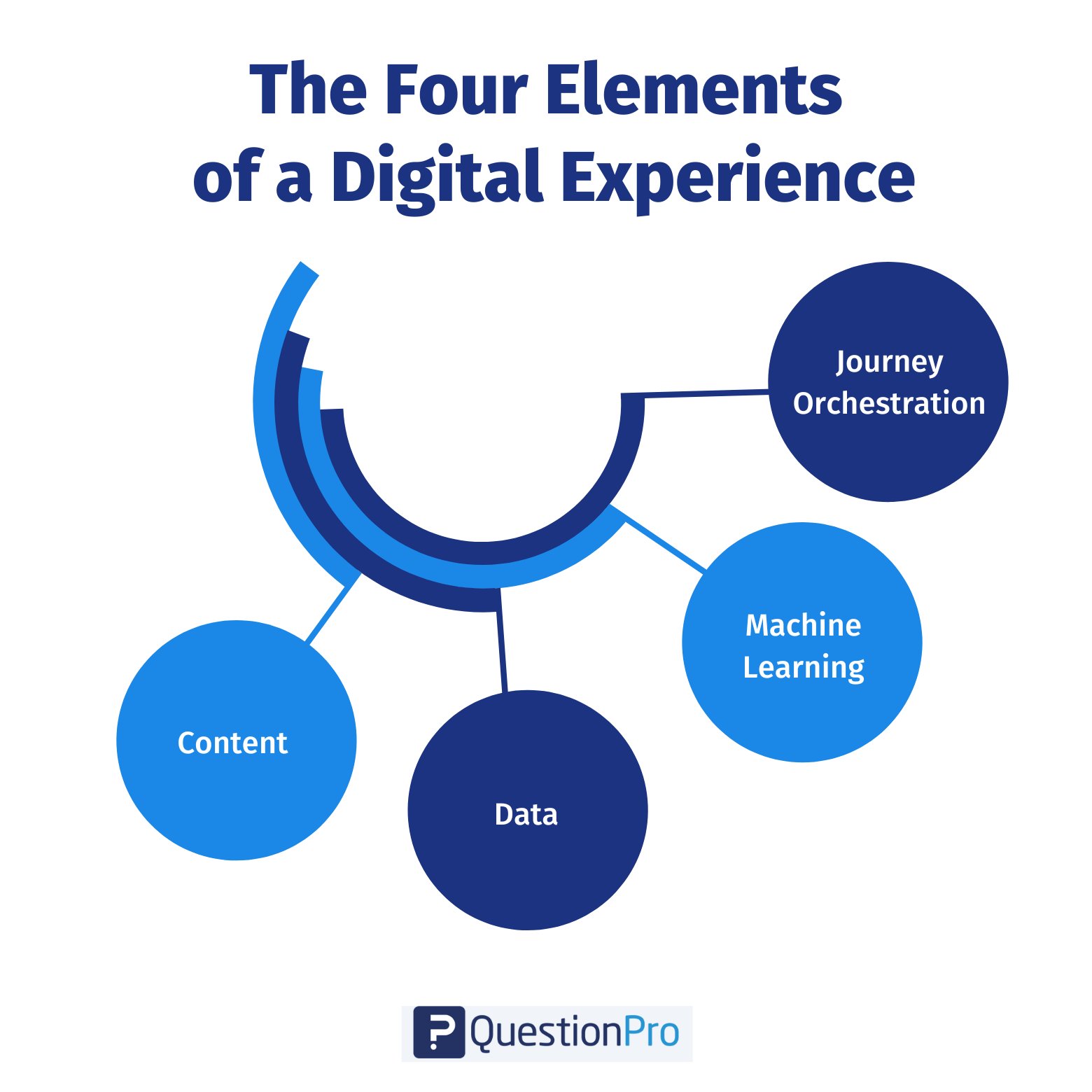
- Content: This is the fun stuff you see online, like articles or ads. A good DXP helps businesses quickly create content and share it everywhere – on websites, apps, and emails.
- Data: This is like the secret sauce that helps businesses understand who you are and what you like. DXPs use this data to make your online experience more personal and enjoyable.
- Machine Learning: This is a fancy way of saying that the tool learns from what you do online. It figures out your preferences and predicts what you might like next, making your online time even better.
- Journey Orchestration: This is like an orchestra conductor, ensuring everything works together smoothly. It helps create a seamless journey so that you feel connected and easy whether you’re on a website or using an app.
When businesses use the right DXP, they usually discover a whole new world of possibilities where the client is the main focus. They get access to tools that help meet their needs and ensure a great experience. It’s an exciting chance to explore new options!
Top 10 Digital Experience Platforms You Need to Know About
Businesses are increasingly relying on digital platforms to enhance their online presence and engage with customers. Here are eight of the top digital platforms that are revolutionizing the way businesses operate and interact with their target audience:
1. QuestionPro CX
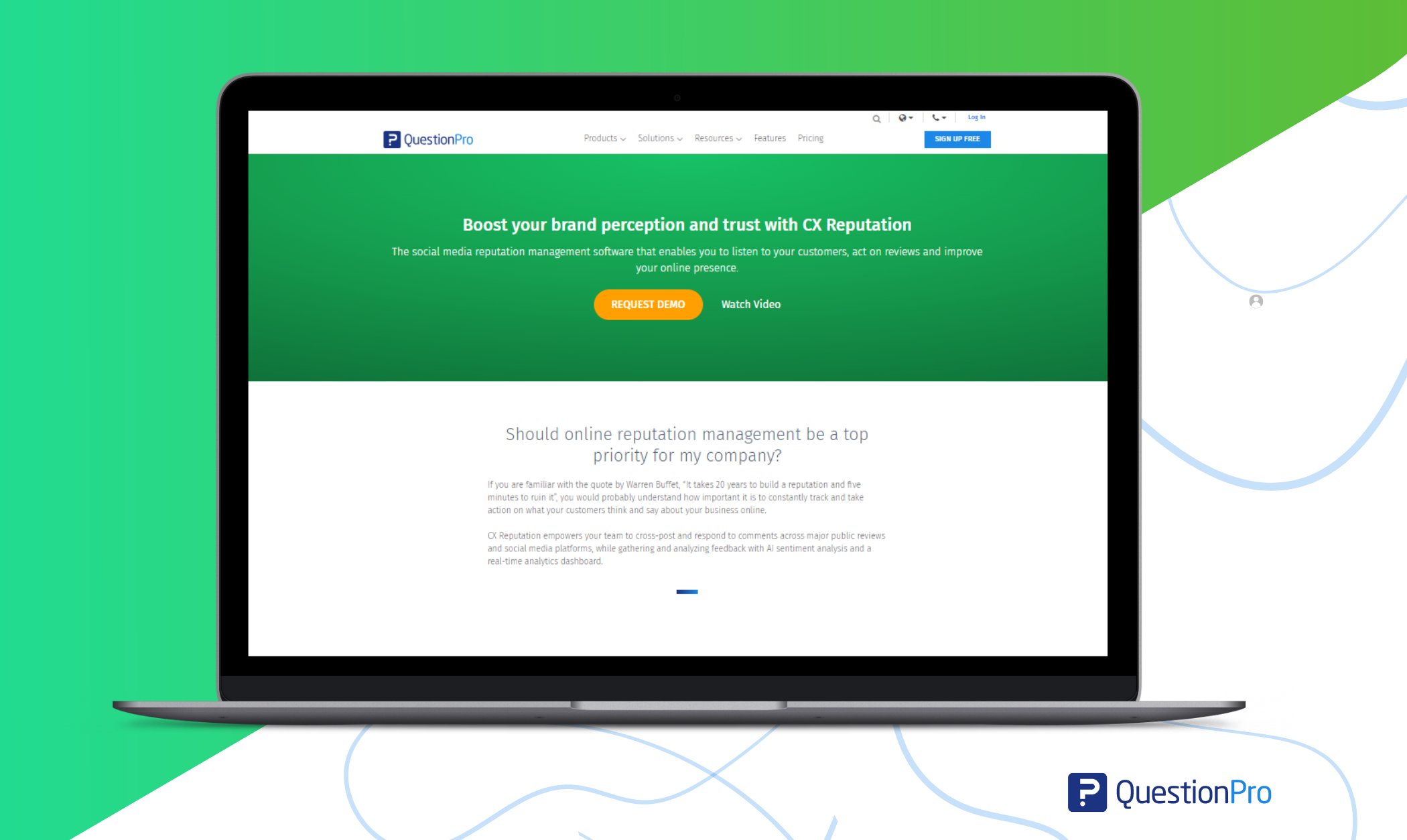
QuestionPro CX is a complete customer experience management platform that encourages businesses to create unique and unforgettable customer journeys. With features like closed-loop feedback and personalized surveys, QuestionPro CX helps businesses boost customer loyalty and satisfaction.
Key Features:
- Robust survey capabilities.
- Personalized customer experiences.
- Advanced analytics.
Pros:
- Multi-channel survey deployment options.
- Closed-Loop Feedback Mechanism.
Cons:
- Limited customization options for advanced survey logic.
Pricing:
QuestionPro offers a range of pricing plans, starting from a free basic plan. Premium plans start from $99 per month, with enterprise-level options available for custom pricing.
2. Bloomreach
Bloomreach is a leading digital experience platform designed to optimize and personalize customer journeys. This platform leverages AI-driven algorithms to analyze user behavior, providing customized recommendations and enhancing overall user engagement. Bloomreach is an excellent solution for businesses aiming to deliver smooth and personalized digital experiences.
Key Features:
- AI-driven personalization.
- Strong user behavior analytics.
- Multi-channel optimization.
Pros:
- Dynamic content recommendations to boost engagement.
- Regular updates and enhancements to improve platform functionality.
Cons:
- The learning curve for initial setup and configuration.
- Advanced features may require additional training.
Pricing:
Bloomreach provides custom pricing based on individual business requirements, with options for scalable plans customized to specific needs.
3. Jahia DXP
Jahia DXP is a robust solution offering a wide range of capabilities, including content management, personalization, and marketing automation. With its focus on flexibility and scalability, Jahia DXP empowers organizations to create and manage dynamic online experiences across multiple channels.
Key Features:
- Flexible and scalable platform.
- Integration of content management and marketing automation.
- Multi-channel delivery.
Pros:
- Personalization capabilities to customize content to individual user preferences.
- Robust developer tools for customization and extensibility.
Cons:
- Complex features and functionalities.
- Customization may require technical expertise or development resources.
Pricing:
Jahia DXP offers custom pricing based on specific business requirements, with options for flexible plans customized to individual needs.
4. Adobe Experience Manager
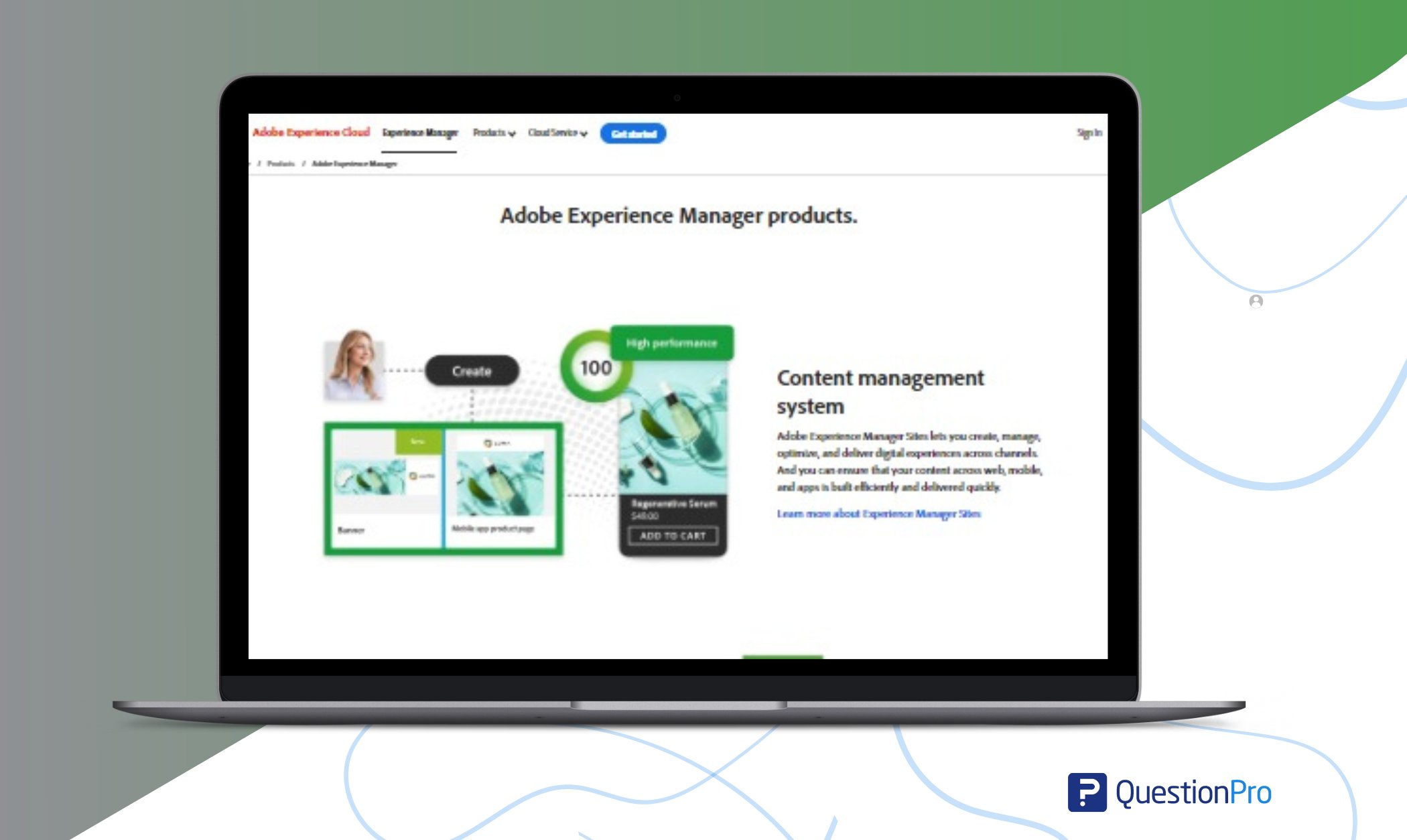
Adobe Experience Manager is a powerful platform that combines web content and digital asset management. It enables businesses to create, manage, and optimize digital content across various channels. Adobe’s intuitive interface and extensive features make it a go-to choice for enterprises seeking an excellent online experience solution.
Key Features:
- Integration of content and asset management.
- Strong multi-channel content delivery.
- Extensive analytics for performance optimization.
Pros:
- Dynamic digital asset management features to manage and distribute media assets effectively.
- Strong community support and regular updates to improve platform functionality.
Cons:
- Higher entry costs for small businesses with limited budgets.
- Skilled developers may be required for advanced customization and development tasks.
Pricing:
Adobe Experience Manager pricing varies based on individual business needs, with options for different pricing tiers and licensing arrangements.
5. Acquia Digital Experience Platform
Acquia DXP is an open-source platform that provides a cloud-based solution for creating, managing, and optimizing digital experiences. With a strong emphasis on Drupal-based content management, Acquia offers scalability and flexibility, making it a popular choice for businesses of all sizes.
Key Features:
- Cloud-based solution for scalability.
- Integration with Drupal for content management.
- Robust tools for optimizing the experience of your customers.
Pros:
- Tools for optimizing experiences and boosting engagement.
- Secure and compliant infrastructure to protect sensitive data and assets.
- Dedicated support and community resources for assistance and collaboration.
Cons:
- Customization may require development resources or technical expertise.
Pricing:
Acquia offers various pricing plans based on individual business requirements, with options for scalability.
6. Magnolia
Magnolia is a content management system (CMS) that excels in delivering personalized online experiences. Known for its simplicity and flexibility, Magnolia enables organizations to create, manage, and optimize content seamlessly. Its modular architecture makes it adaptable to diverse business needs.
Key Features:
- Simplicity and flexibility in content management.
- Modular architecture for adaptability.
- Emphasis on delivering personalized online experiences.
Pros:
- Strong community support for collaboration and knowledge-sharing.
- Regular updates and enhancements to improve platform functionality and performance.
Cons:
- Limited out-of-the-box features compared to other CMS platforms.
- Customization may require development resources or technical expertise.
Pricing:
Magnolia typically offers custom pricing based on specific business requirements, with options for scalable plans tailored to individual needs.
7. Salesforce Marketing Cloud
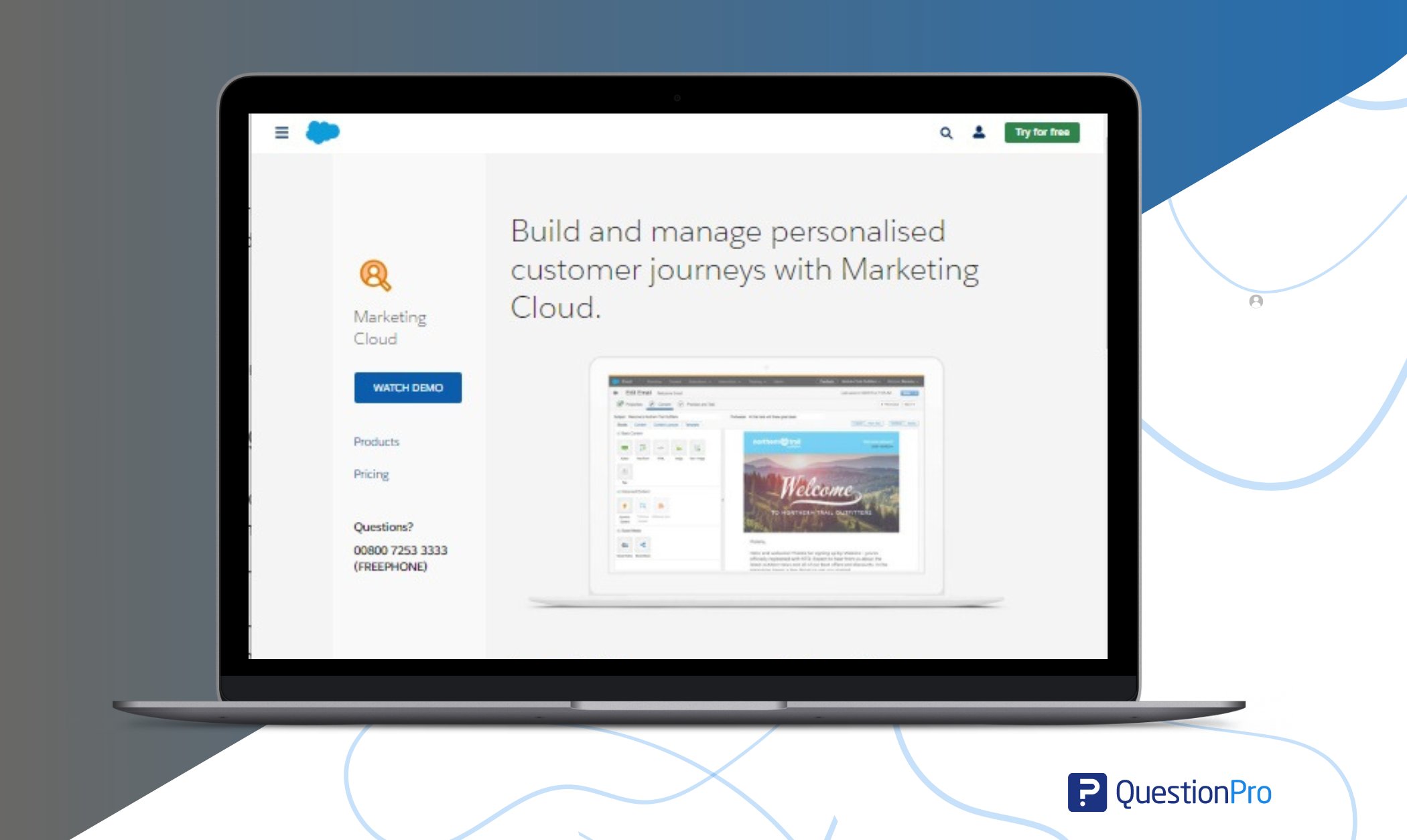
Salesforce Marketing Cloud is a comprehensive marketing automation platform that facilitates personalized and targeted marketing campaigns. With tools for email marketing, social media management, and analytics, Salesforce Marketing Cloud empowers businesses to engage effectively with their audience.
Key Features:
- Tools for email marketing, social media management, and analytics.
- Personalization for targeted marketing campaigns.
Pros:
- Scalability to accommodate businesses of all sizes, from startups to enterprises.
- Dedicated support and resources for training, implementation, and ongoing assistance.
Cons:
- Higher entry costs for smaller businesses with limited budgets.
- Advanced features may require additional training or technical expertise.
Pricing:
Salesforce Marketing Cloud pricing varies based on individual business needs and selected modules, with options for scalable plans customized to specific requirements.
8. WordPress VIP
WordPress VIP is a fully managed WordPress hosting solution designed for high-performance and enterprise-level security. It provides a scalable and reliable infrastructure for organizations relying on WordPress as their content management system. Major brands trust WordPress VIP for its stability and support.
Key Features:
- Fully managed WordPress hosting for stability.
- Enterprise-level security measures.
- Scalable infrastructure for high-performance.
Pros:
- Dedicated support and resources for assistance with implementation, maintenance, and troubleshooting.
- Integration with the broader WordPress ecosystem for access to plugins, themes, and development resources.
Cons:
- Higher entry cost compared to traditional WordPress hosting solutions.
- Limited customization options compared to self-hosted WordPress installations.
Pricing:
WordPress VIP offers custom pricing based on specific business requirements, with options for scalable plans customized to individual needs.
9. Sitecore Experience Platform
Sitecore Experience Platform is an advanced digital experience platform that provides personalized content delivery and omnichannel customer engagement. It offers tools for content management, marketing automation, and customer data management, allowing businesses to create seamless and targeted digital experiences.
Key Features:
- Integrated content management and customer data platform.
- Omnichannel engagement for consistent experiences across touchpoints.
- Advanced analytics for performance tracking.
Pros:
- Strong capabilities for marketing automation and data-driven personalization.
- Scalable for businesses of all sizes and industries.
Cons:
- Requires technical expertise for setup and advanced customization.
- Higher costs for enterprise-level solutions.
Pricing:
- Sitecore offers flexible pricing plans based on the needs of the business, with custom pricing available for enterprise-level solutions.
10. Medallia

Medallia is a powerful digital experience platform that helps businesses capture and analyze customer feedback across all touchpoints. It uses real-time data to provide insights that can drive improvements in customer experiences and enhance engagement.
Key Features:
- Real-time customer feedback collection.
- Advanced AI-driven insights.
- Omnichannel experience management.
Pros:
- Excellent customer support and assistance.
- AI-driven insights for more actionable feedback.
- Strong integration capabilities with other platforms.
Cons:
- Complex setup for new users.
- Customization may require additional resources or expertise.
Are you curious about CX Platforms? QuestionPro’s recent article breaks it all down for you!
How is a DXP Different From a CMS?
Digital Experience Platforms and Content Management Systems (CMS) are related concepts but serve different purposes in the digital landscape. Here are the key differences between a DXP and a CMS:
| Factor | Content Management System (CMS) | Digital Experience Platform (DXP) |
| Scope and Functionality | A CMS primarily focuses on content creation, management, and publication. | A DXP extends beyond content management and encompasses a broader range of capabilities. |
| User Experience and Personalization | While CMS platforms allow for the creation and organization of content, they may have limitations in delivering personalized and contextual user experiences. | DXPs prioritize delivering highly personalized and engaging digital experiences. |
| Multi-channel Capabilities | Traditional CMS platforms are designed primarily for web content management. While some may offer plugins or extensions for additional channels, they may not seamlessly integrate with various touchpoints. | DXPs are built to deliver consistent and strong experiences across multiple digital channels, including websites, mobile apps, social media, email, and more. They provide a unified approach to managing content and interactions across diverse platforms. |
| Integration with Third-Party Systems | CMS platforms often focus on managing content within the website and may have limitations when it comes to integrating with other business operations or applications. | DXPs are designed with integration in mind. They often have robust capabilities to connect with third-party systems, ensuring a seamless flow of data and functionality across various tools and platforms. |
| Business Functionality | CMS solutions are essential for businesses that primarily need to manage and publish content on their websites. | DXPs are ideal for businesses aiming to create excellent and engaging digital experiences beyond content management. |
What to Consider When Choosing a DXP?
When choosing Digital Experience Platforms, several crucial factors should be considered to ensure the platform aligns with your business needs and goals:
Aligning Requirements with Goals
Avoid getting swayed by flashy features and the latest trends. Your company’s needs are unique, so ensure your wish-list features are based on realistic goals rather than being driven by trends or buzzwords. Separate requirements into immediate needs and nice-to-haves for future phases.
Thorough References Inquiry
While seeing examples of success is essential, delve deeper when seeking references and case studies. Request look-a-like case studies customized to your industry, use case, or customer profile. A reliable technology provider should be able to share relevant cases that resonate with your specific needs.
Avoiding Compromises
As in personal relationships, compromising technology decisions can lead to dissatisfaction.
Consider exploring alternative options when facing speed, quality, cost, or support compromises. Opt for a vendor that provides the best of both worlds, offering a balance between speed and quality without compromising your specific requirements.
When to Use Digital Experience Platforms?
Deciding when to use a digital experience platform (DXP) can be tricky, as many vendors are promoting their solutions. While the ideal timing varies for each organization, certain objectives signal that a DXP may be beneficial:
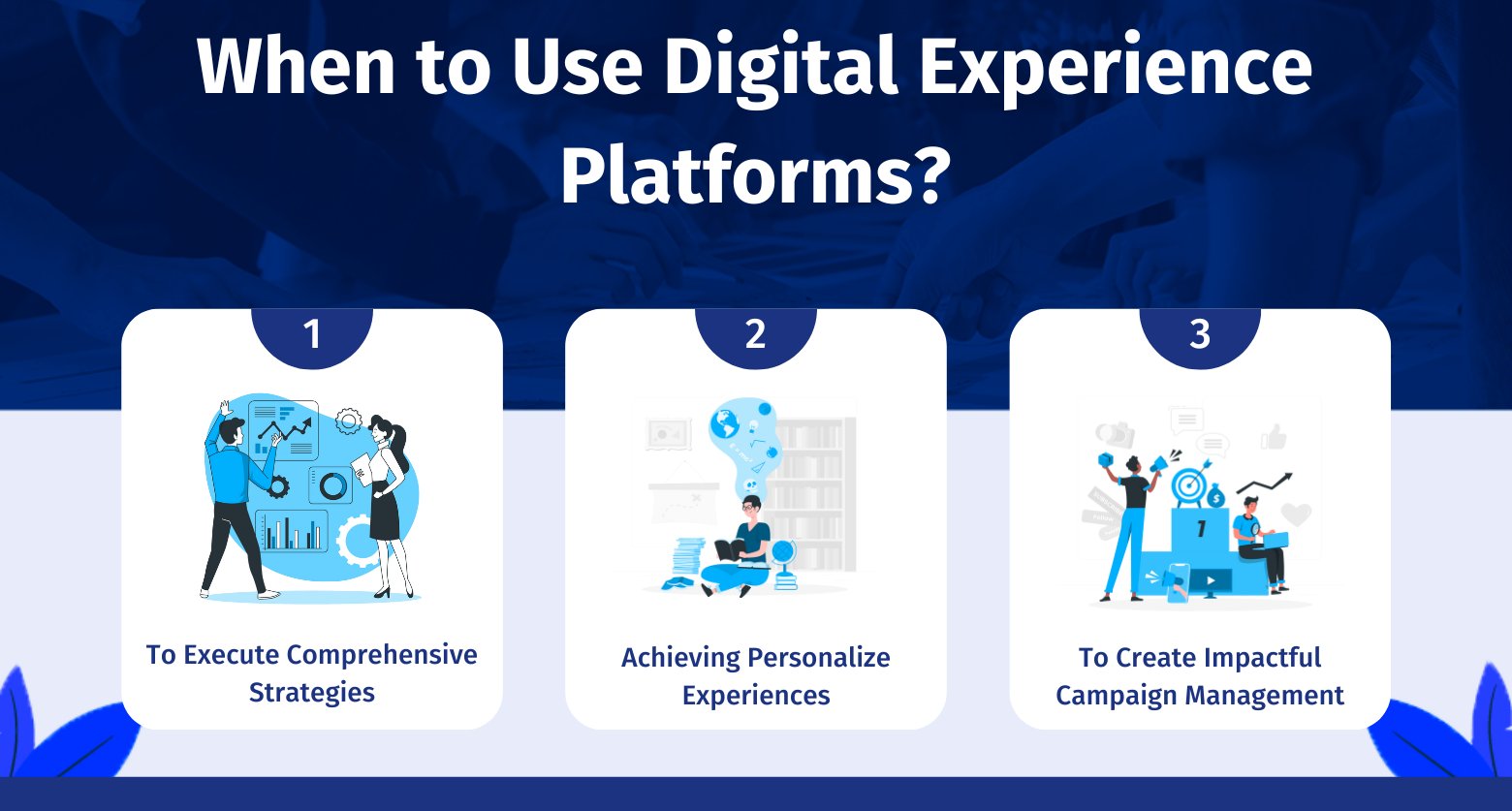
To Execute Excellent Strategies
Every digital strategy doesn’t necessarily demand a DXP, but organizations with long-term omnichannel marketing goals should consider adopting one sooner. As digital strategies become more ambitious, tracking what’s effective becomes challenging.
A DXP eliminates data silos by connecting customer data across all digital touchpoints and content. This helps marketers execute their strategies with increased speed, agility, and confidence.
Achieving Personalize Experiences
Achieving personalization at scale is tough without technology’s help. However, many technologies only address specific parts of the user experience, lacking a holistic view.
A DXP solves this by unifying all data and digital experience tools into one platform. This provides organizations with a deeper understanding of customer relationship management, enabling smarter and more effective personalization tactics for more relevant customer experiences.
To Create Impactful Campaign Management
Campaigns demand quick insights and rapid action, and a DXP excels in this area. It consolidates and leverages data from various sources for speedy analysis. Beyond that, campaigns require continuous optimization and A/B testing, often requiring marketers to wait for developers to make updates.
A DXP empowers marketers with the tools to make these updates independently and push changes live without delays.
The Advantages of a Digital Experience Platform
Unlocking the potential of a Digital Experience Platform can lead to numerous benefits for you and your company:
- Omnichannel Content Management: A DXP’s standout advantage is its versatility. Unlike traditional content management systems (CMS) or web experience management (WEM) solutions, DXPs excel at seamlessly covering various touchpoints. Firms no longer need separate tools for managing content, as a DXP serves as a unified solution.
- Collaboration and Cohesiveness: Growing channels often result in disconnects between managing teams, leading to inefficiency and collaboration challenges. A DXP, with its integrated applications, addresses this issue. Breaking content silos between teams is a key feature, thanks to built-in integrations within the DXP solutions.
- Personalized Experiences: With seamless connections between systems and channels, every customer journey can be personalized at each step. Data is consolidated and unified using a single platform, providing your company with a complete 360-degree view of customer behavior.
- Positive, User-Centric Experience: Modern DXPs take a personalized approach by analyzing user data and behavior to optimize sales and marketing activities. Many DXPs offer content recommendations, A/B testing, and AI-powered techniques to meet end users’ needs effectively.
- Elasticity: DXPs offer flexibility as your company and the market evolve. New components or applications can be easily added to the DXP, continuing to share data with other elements and bringing value as the organization grows. The adaptable nature of DXPs ensures easy adoption and straightforward integration with other tools and APIs.
- Anytime, Anywhere Access: Cloud-based DXPs are ideal for today’s remote working style. Many DXPs come with real-time alerts and monitoring systems, offering service access policies that support a flexible and accessible work environment.
Choosing QuestionPro as The Best DXP to Use
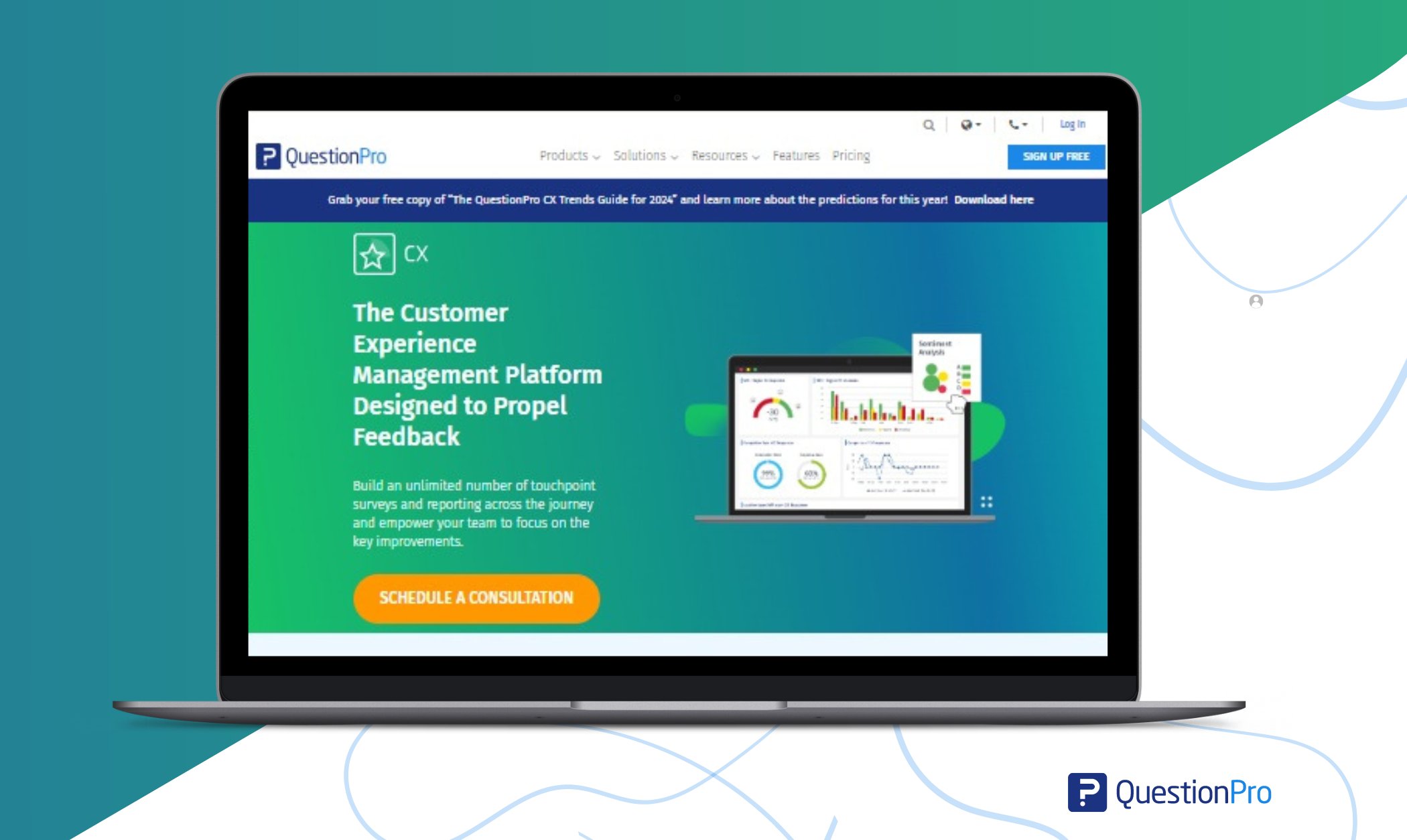
Choosing the right Digital Experience Platform is crucial for businesses aiming to deliver exceptional online experiences to their customers. QuestionPro stands out as a top choice in this context due to its excellent features, user-friendly interface, and robust capabilities. Let’s explore why QuestionPro is the best DXP to use:
Strong Experience Management
QuestionPro offers a holistic approach to customer experience management, allowing businesses to seamlessly create, monitor, and optimize the entire customer journey. QuestionPro provides all the tools necessary to understand and improve the digital experience, from collecting feedback to analyzing sentiment.
Versatile Survey Capabilities
At the core of QuestionPro’s DXP is its robust survey platform, enabling businesses to gather valuable insights from their customers at every touchpoint. With a wide range of survey features and customization options, QuestionPro empowers businesses to tailor surveys to their specific needs and gather actionable feedback.
Closed-Loop Feedback Mechanism
One of QuestionPro’s standout features is its closed-loop feedback mechanism, which ensures that customer feedback is collected and acted upon promptly. By creating tickets for detractors and assigning them to the appropriate team members, businesses can address issues in real-time and demonstrate their commitment to customer satisfaction.
Personalized Customer Experiences
QuestionPro enables businesses to deliver personalized online experiences that resonate with their customers. Through advanced analytics and segmentation capabilities, businesses can customize content, offers, and interactions to meet individual customers’ unique needs and preferences, creating deeper connections and loyalty.
Integration Capabilities
QuestionPro seamlessly integrates with a wide range of third-party tools and platforms, allowing businesses to leverage existing systems and data to enhance their online experiences further. Whether it’s integrating with CRM systems, marketing automation tools, or analytics platforms, QuestionPro ensures a seamless and efficient workflow.
Conclusion
Digital Experience Platforms play a crucial role in helping businesses deliver smooth and personalized digital experiences to their customers. The top 10 DXPs mentioned above offer a range of features and capabilities to enable businesses to create compelling online experiences that boost engagement, loyalty, and revenue.
By leveraging the power of these DXPs, businesses can stay ahead of the competition and delight their customers at every touchpoint. QuestionPro is the best Digital Experience Tool due to its versatile survey capabilities, excellent customer experience automation management features, user-friendly interface, advanced analytics, and customization options.
By choosing QuestionPro, businesses can enhance their contextualized digital experiences, improve customer satisfaction, and boost growth in today’s competitive landscape. Contact the QuestionPro team for further information.
Frequently Asked Questions (FAQ)
A DXP is an integrated suite of tools that enables companies to deliver engaging digital experiences across various channels.
Key components include content management, customer data management, personalization, analytics, and multichannel delivery.
While traditionally used by larger enterprises, there are scalable DXP solutions available that cater to the needs of small businesses.
Yes, by providing personalized and seamless experiences, DXPs can significantly improve customer retention.




